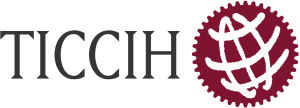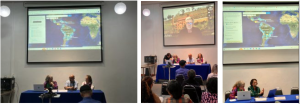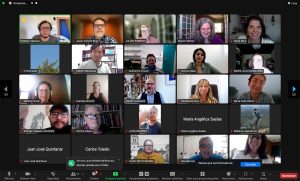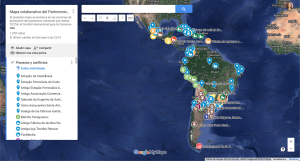
TICCIH MapaPI
Proyecto MapaPI: Mapa colaborativo del Patrimonio Industrial en América Latina y el Caribe
El Proyecto TICCIH MapaPI comenzó en febrero de 2023 como una iniciativa de la Comisión “TICCIH en Portuñol”, que fue creada después de la Asamblea General de TICCIH de 2022 en Montréal desde el Board de TICCIH-Internacional con el fin de apoyar el trabajo y la creación de redes regionales del nuevo Comisionado de TICCIH para América Latina y el Caribe.
El proyecto nació con el objetivo de visualizar la amplia variedad del patrimonio industrial en América Latina y el Caribe utilizando técnicas de registro en línea basadas en la geolocalización. Su elemento central es un mapa interactivo en Internet que evoluciona constantemente y se nutre de una multitud que actualmente ronda los 150 colaboradores del proyecto, quienes quieren compartir sus conocimientos sobre elementos del patrimonio industrial, tanto materiales como inmateriales. MapaPI está siendo coordinado conjuntamente por TICCIH-Internacional, el Comisionado de TICCIH para América Latina y el Caribe, y miembros de TICCIH en América y Europa, a través de la Comisión TICCIH en Portuñol.
Desde la coordinación del proyecto, nuestra convicción fundamental es que las diversas prácticas laborales, empresariales, técnicas, sociales y simbólicas inherentes a los espacios del trabajo antiguos y actuales pueden visualizarse en un mapa desde múltiples perspectivas, integrando las dimensiones tangibles e intangibles que componen el patrimonio industrial. La cartografía colaborativa de elementos, conjuntos y sistemas industriales presentes en toda la región es una forma interactiva que nos permite identificar relaciones e interconexiones, comprender mejor lugares concretos y funciones específicas, y explicar los diversos modos de producción de la industria en el tiempo y en el espacio.
Desde un punto de vista académico, el proyecto MapaPI se inserta en las prácticas de las Humanidades Digitales, aplicadas por investigadoras e investigadores de las Ciencias Sociales que utilizan las Tecnologías de la Información y la Comunicación y las nuevas herramientas de análisis digital para crear nuevas perspectivas sobre y en torno a los objetos de investigación, permitiéndonos así no sólo conocer, sino hacernos nuevas preguntas. Para nuestro proyecto de mapeo colaborativo, esto es particularmente interesante porque la reorientación de los enfoques nos permite cuestionar las formas tradicionales eurocéntricas de explicar la “Revolución Industrial” y los procesos de transferencia de tecnología que típicamente se han definido en una dirección Norte-Sur, abriendo nuevas oportunidades para redefiniciones conceptuales, teóricas y metodológicas desde el Sur.
MapaPI es un proyecto procesional, evolutivo y colaborativo que se está llevando a cabo en varias fases. Durante la primera fase, que comenzó el 3 de febrero de 2023, desarrollamos un marco teórico inicial, definimos los objetivos de alcance y elegimos la plataforma cartográfica.
La segunda fase inició el 4 de octubre de 2023 con la celebración del Primer Taller MapaPI Online “Mapa Colaborativo del Patrimonio Industrial en América Latina y el Caribe”, que al mismo tiempo se celebró como el “2º Encuentro Global de TICCIH”, esta vez realizado íntegramente en español. Se convocó a las y los miembros y amigos de TICCIH de todo el mundo que están trabajando en el Patrimonio Industrial de América Latina y el Caribe. Durante la reunión, presentamos el proyecto y lanzamos el proceso de mapeo colaborativo en My Maps, y el 8 de octubre pusimos en marcha una plataforma de comunicación interna para todas y todos los miembros del proyecto, que luego tuvieron 20 días de tiempo para subir una primera versión de sus sitios.
El 24 de octubre de 2023, iniciamos la tercera fase con una sesión híbrida especial dedicada al proyecto MapaPI, como parte del programa oficial del X Coloquio Latinoamericano de Patrimonio Industrial, que se celebró en Monterrey, México. En esta sesión de dos horas de duración, presentamos de forma colaborativa los resultados obtenidos hasta la fecha, tomamos nota del gran entusiasmo existente en torno al proyecto y, en consecuencia, acordamos continuar con el proceso. Se ha invitado a todas y todos los miembros del proyecto a depurar las imprecisiones detectadas y a incorporar nuevas sugerencias hasta la próxima reunión.
La cuarta fase inició el miércoles, 13 de marzo de 2024, con la celebración del Segundo Taller MapaPI Online. En esa instancia revisamos los avances en el mapa, discutimos la necesidad de desarrollar nuevos lineamientos conceptuales y prácticos e iniciamos la creación de una Comisión Editorial para el proyecto MapaPI. El evento fue transmitido por YouTube gracias a nuestros colegas de El Colef (link abajo). Tras este taller, a lo largo del año 2024, un Comité Editorial inicial debatió y definió los enfoques de los futuros grupos de trabajo, recibió solicitudes de personas que expresaron su interés en formar parte del Comité Editorial de MapaPI y comenzó a planificar los siguientes pasos del proyecto.
El 21 de enero de 2025 finalmente, inicia la quinta fase del proyecto con una reunión del Comité Editorial definitivo de MapaPI, a la cual la coordinación general del proyecto convocará a las personas integrantes del Comité Editorial MapaPI inicial, al Comité TICCIH en Portuñol y a las personas que en meses pasados habían postulado para incorporarse al Comité Editorial de MapaPI y que durante el mes de enero han confirmado su interés y disponibilidad de seguir trabajando en el proyecto.
Iniciamos el año 2025 con mucho entusiasmo, y prontamente les informaremos por aquí de los nuevos avances de TICCIH MapaPI.
Saludos cordiales,
El Comité TICCIH en Portuñol:
Marion Steiner, Secretaria General de TICCIH Internacional
Camilo Contreras, Comisionado de TICCIH para América Latina y el Caribe
Julián Sobrino, Miembro de la Junta Directiva de TICCIH España
Carolina Castañeda, Board Member TICCIH Internacional y TICCIH España
María Julia Burgueño, Coordinadora de TICCIH en Uruguay
Mónica Ferrari, TICCIH Argentina
y el Comité Editorial inicial MapaPI:
Guilherme Pozzer, Brasil/ Inglaterra
Olivia Nery, TICCIH Brasil
María Celia González, México
Rodrigo Chaparro Montaña, México/ Colombia
Norma Aldaz, México
Evandro Fiorín, Brasil
Esteban Vásquez, Chile
Nelly Azalia Martínez, México
Enlaces importantes:
Convocatoria al Primer Taller MapaPI Online: en Español; en Inglés
Programa y PPTs del Primer Taller MapaPI Online (4.10.2023): https://ticcih.org/taller-mapa/
Grabación del Primer Taller MapaPI Online & 2° TICCIH Global Members Meeting: https://www.youtube.com/watch?v=0gDwz9Ldwp0&t=13s
Recomendaciones técnicas para cartografiar sitios: en Español; en Inglés
Grabación de la sesión MapaPI durante el Congreso 2023 de Monterrey: https://www.youtube.com/watch?v=z2q8shOEgv0&t=6144s
Recomendaciones para ir perfeccionando el mapa: en Español (13.2.2024)
Programa y PPTs del Segundo Taller MapaPI Online (13.3.2024): https://ticcih.org/taller-mapapi-2/
Grabación del Segundo Taller MapaPI Online: https://www.youtube.com/watch?v=8dxnsr3siPo
Próximamente:
Reunión del Comité Editorial definitivo MapaPI
Contacto:
¿Alguna pregunta sobre el proyecto? Escríbanos a: tallermapapi[at]gmail.com
TICCIH MapaPI Project: Collaborative Mapping of Industrial Heritage in Latin America and the Caribbean
The TICCIH MapaPI Project started in February 2023 as an initiative of the TICCIH in Portuñol Commission, which was created after the TICCIH General Assembly 2022 in Montréal by the TICCIH-International Board in order to support the work and regional networking of the new TICCIH Commissioner for Latin America and the Caribbean.
The project was born with the aim to visualize the broad variety of industrial heritage across Latin America and the Caribbean using online registration techniques based on geolocation. Its core element is an interactive map on the Internet that is constantly evolving and fed by a crowd of currently around 150 project collaborators who are keen to share their knowledge on both tangible and intangible industrial heritage elements. MapaPI is being coordinated jointly by TICCIH-International, the TICCIH Commissioner for Latin America and the Caribbean, and TICCIH members from the Americas and Europe, through the TICCIH in Portuñol Commission.
From the project coordination, our fundamental conviction is that the diverse labour, business, technical, social and symbolic practices that are inherent to former and current workspaces can be visualized on a map, integrating both the tangible and intangible dimensions of industrial heritage from multiple perspectives. The collaborative mapping of industrial elements, sets and systems across the region is an interactive way that allows us to identify diverse relationships and interconnections, to better understand specific places and specific functions, and to explain the modes of industrial production that vary and change over time and space.
From an academic viewpoint, the MapaPI project is part of the Digital Humanities practices applied by Social Sciences researchers who use Information and Communication Technologies and new digital analysis tools to create new perspectives on and around research objects and sites, thus enabling us to ask new questions related to them. For our collaborative mapping project, this is particularly interesting because these new approaches allow us to question the traditional Eurocentric ways of explaining the “Industrial Revolution” and the technology transfer processes that are typically defined in a North-South direction, opening up new opportunities for conceptual, theoretical and methodological redefinitions from the South.
MapaPI is a processional, evolutionary and collaborative project, which is being implemented in several phases: During the first phase, which started on 3 February 2023, we developed an initial theoretical framework, defined scope objectives and chose the cartographic platform.
The second phase initiated on 4 October 2023 with the celebration of the project’s First Online Workshop “Collaborative Mapping of Industrial Heritage in Latin America and the Caribbean,” which at the same time was held as the “2ndTICCIH Global Members Meeting,” this time entirely in Spanish. TICCIH members and friends from across the world who are working on the Industrial Heritage of Latin America and the Caribbean were invited to join. During the meeting, we presented the project and launched the collaborative mapping process on My Maps, and on 8 October set up an internal communication platform for all the project members who then had 20 days time to upload a first version of their sites.
On 24 October 2023, we started the third phase with a special hybrid session dedicated to the MapaPI project, as a part of the official program of the 10th Latin American Industrial Heritage Colloquium, which was held in Monterrey, Mexico. In this two-hours-session, we collaboratively presented the results obtained to that date, took note of the great enthusiasm around the project, and consequently agreed to continue the process. All project members have been invited to refine the inaccuracies that have been detected and to incorporate new suggestions until the next meeting.
The forth phase started on Wednesday, 13th of March 2024, with the celebration of the Second MapaPI Online Workshop. That day, we revised the state-of-the-art of the map’s contents, discussed the need for developing new conceptual and practical guidelines, and initiated the creation of an Editorial Committee for the MapaPI project. The event was broadcast on YouTube thanks to our colleagues at El Colef (link below). After this workshop, throughout the year 2024, an initial Editorial Committee discussed and defined the focus of the future working groups, received applications from people who expressed their interest in joining the MapaPI Editorial Committee, and started to plan the next steps of the project.
On January 21, 2025, the fifth phase of the project finally begins with a meeting of the definitive MapaPI Editorial Committee, to which the general coordination of the project convened the members of the initial MapaPI Editorial Committee, the TICCIH in Portuñol Commission and the people who in past months had applied to join the MapaPI Editorial Committee and who during the month of January have confirmed their interest and availability to continue working on the project.
We begin the year 2025 with great enthusiasm, and we will soon inform you here about the new developments of TICCIH MapaPI.
Kind regards,
The TICCIH in Portuñol Commission:
Marion Steiner, TICCIH Secretary General
Camilo Contreras, TICCIH Commissioner for Latin America and the Caribbean
Julián Sobrino, Board Member of TICCIH Spain
Carolina Castañeda, Board Member of TICCIH International and TICCIH Spain
María Julia Burgueño, Coordinator of TICCIH in Uruguay
Mónica Ferrari, TICCIH Argentina
and the initial MapaPI Editorial Committee:
Guilherme Pozzer, Brasil/ England
Olivia Nery, TICCIH Brasil
María Celia Gonzalez, Mexico
RodrigoChaparro Montaña, Mexico/ Colombia
Norma Aldaz, Mexico
Evandro Fiorín, Brasil
Esteban Vásquez, Chile
Nelly Azalia Martínez, Mexico
Important links:
Call for the First MapaPI Online Workshop: in Spanish; in English
Program and PPTs of the First MapaPI Online Workshop (4.10.2023): https://ticcih.org/taller-mapa/
Recordings of the First MapaPI Online Workshop & 2nd TICCIH Global Members Meeting: https://www.youtube.com/watch?v=0gDwz9Ldwp0&t=13s
Technical recommendations for mapping sites: in Spanish; in English
Recordings of the MapaPI Project session during the Monterrey 2023 congress: https://www.youtube.com/watch?v=z2q8shOEgv0&t=6144s
Recommendations for improving the map: en Español (13.2.2024)
Program and PPTs of the Second MapaPI Online Workshop (13.3.2024): https://ticcih.org/taller-mapapi-2/
Recordings of the Second MapaPI Online Workshop: https://www.youtube.com/watch?v=8dxnsr3siPo
Next milestone:
Meeting of the definitive MapaPI Editorial Committee
Contact:
Any question about the project? Please write us: tallermapapi[at]gmail.com




